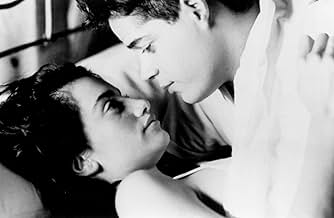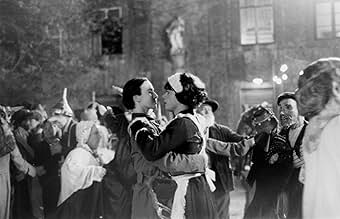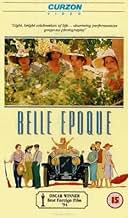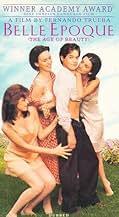IMDb-BEWERTUNG
7,1/10
11.917
IHRE BEWERTUNG
Ein Deserteur des spanischen Militärs aus dem Jahr 1931 findet sich auf einem einsamen Bauernhof wieder, bis die vier Töchter des Bauern zu Besuch kommen und er sich in sie alle verliebt.Ein Deserteur des spanischen Militärs aus dem Jahr 1931 findet sich auf einem einsamen Bauernhof wieder, bis die vier Töchter des Bauern zu Besuch kommen und er sich in sie alle verliebt.Ein Deserteur des spanischen Militärs aus dem Jahr 1931 findet sich auf einem einsamen Bauernhof wieder, bis die vier Töchter des Bauern zu Besuch kommen und er sich in sie alle verliebt.
- 1 Oscar gewonnen
- 25 Gewinne & 15 Nominierungen insgesamt
Joan Potau
- Paco
- (as Juan Potau)
Empfohlene Bewertungen
10Johnny B
Belle Epoque is one of those movies you don't see every weekend at the theatre. It is a film set in a certain age (in this case: Spain during the times of the civil war), where the age itself is not very important, but it effects the way the story evolves. The best thing of all in this film is the acting and the comedy. The farce is excellent - hardly ever seen a film with such intelligent humourism. The first time I saw the film was in Spanish and I laughed my guts out (even though I do not know Spanish a lot ). The story too is not too complicated and at the same time it is not at all banal. The highlight of the film, in my opinion, is when the wife of Manolo goes to visit him and starts singing an aria from some opera. Some of the comic highlights of this movie are when Rojio is asked to try her mother-in-law -to-be's wedding dress and when Juanito enters her bed. The best quote from the film is Clara's: "A Woman cannot stay without a man, especially at night." Anyway, just about everything about this movie is great. Well, in short, WATCH IT
8=G=
"Belle Epoque" is a light-hearted comedy romp which tells of the goings-on at a Spanish villa (circa 1931) involving a patriarch, his four beautiful and amorous daughters, and a wayward young man who can't say "no". Fanciful, warm, fun, and sexy, this Oscar winning film flows like honey as it aims for the heart, not the crotch or head, and hits the mark. Most likely to be appreciated by more seasoned viewers with an interest in Europics. (A-)
Note - This film has considerable dialogue making for significant subtitle reading for non-Spanish speakers.
Note - This film has considerable dialogue making for significant subtitle reading for non-Spanish speakers.
This awesome film has a simple plot : A man , four women and a lot of romance . It deals with a Spanish soldier named Fernando (Jorge Sanz) deserts from the army in 1931, at the beginning of Spanish Republic , a time of optimism and promise and previous Civil War (1936-1939) . Fernando flees only to find himself detained by a pair of local Guardia Civil . The hearty young boy and main character, well portrayed by Jorge Sanz (still one of Spain's most promising young actors), breaks outs and soon is befriended a lonely ,elderly man called Manolo (Fernando Fernan Gomez) in a little village . Problems arise when the Manolo's four daughters (Penelope Cruz , Miriam Diaz Aroca , Maribel Verdu , Ariadna Gil) come to visit their daddy and the soldier quickly enchanted falls in love with each of them . Fernando likes all of them and they like him , so he must decide which one to love , or Rocio, Violeta, Clara and Luz .
Earthy comedy with historical and romantic elements ; including enjoyable performances , adequate set design and delightfully shot . ¨Belle Epoque" , ¨The age of beauty¨ results to be other of the innumerable stories to deal with youthful love , being developed in mirth , lively and vital style . An agreeable story in which an ex-soldier escapes and discovers the opposite sex on the way , it is plenty of amusing moments , moving feelings and fun finale . It is a light , wistful romantic comedy , easy to watch , and easier to love . A very pleasant romantic comedy plenty of humor , emotion , sensitive scenes and mayhem . "Belle Epoque" is Trueba's return to top form, with an intelligent and engaging script which uses amusing situations to give us a good movie in a high sense and intimate sensitivity and that kept me entertained for the almost two hours of duration . It is well set and is as marvelously filmed as it is written and acted . This is one of those rare gems that does not stray from its purpose - to be a celebration of love and romance and humorous tale of a young boy controlled by his libido . Oscarized director Fernando Trueba , also writes the interesting script along with prestigious screenwriters as Jose Luis Garcia Sanchez and Rafael Azcona , Luis Garcia Berlanga's ordinary . Filmed in his usual formal and luxurious style , without leaving a trace the joyful themes , in terms of dramatic and narrative excitement . The film is light and never somber, no small accomplishment from Fernando Trueba and his team . Very good secondary cast formed by Spanish familiar faces such as Gabino Diego , Agustin Gonzalez , Maria Galiana , Juan Jose Otegui , Mary Carmen Ramirez , Chus Lampreave : Almodovar's usual and the French Michel Galabru . Colorful and evocative cinematography by Jose Luis Alcaine , one of the best Spanish cameramen . Gorgeous exteriors filmed in Portugal ; Fernando Trueba shot the movie in Portugal for two main reasons : 1) he couldn't find any place similar to what he had in mind in Spain and 2) the use of that Portuguese location allowed him to empathize the tone of fable the story required . Jolly as well as sensitive musical score by Antoine Duhamel , including Non-Original music by Pablo Sorozábal from opera "La Taberna del Puerto" and some catching song as when Gabino comes to serenade Rocìo, he sings "Las Mañanitas" which in México is used to celebrate a birthday .
This simple , attractive and delightful motion picture was well directed by Oscar-winning director Fernando Trueba , as the flick is entertaining and well worth your time . His first success was Ópera Prima (1980) following the style of the "Madrid comedy". Trueba had major success with Sé Infiel y No mires Quién (1985) also known as : Be Wanton and Tread No Shame , starting a longer collaboration with the producer Andrés Vicente Gómez . He went on directing numerous successes such as Coarse salt , Too Much , Year of Enlightment , Milagro de Candeal , Niña De Tus Ojos or The Girl of Your Dreams , Calle 54 , Embrujo De Shanghai , Chico and Rita and recently : The Artist and the Model. The multi-award winner in Spain Fernando Trueba was President of the Spanish Academy of Motion Picture Arts and he received the 1994 Oscar for Best Foreign Film to Belle Epoque (1992)and when accepting his Academy Award for Best Foreign Language Film, director (Fernando Trueba) said: "I would like to believe in God in order to thank him for this prize, but I only believe in (Billy Wilder), so... Thank you, Mr. Wilder!". Wilder himself reportedly phoned Trueba a few days later for acknowledgment and told him: "Hello Fernando, I'm God".
Earthy comedy with historical and romantic elements ; including enjoyable performances , adequate set design and delightfully shot . ¨Belle Epoque" , ¨The age of beauty¨ results to be other of the innumerable stories to deal with youthful love , being developed in mirth , lively and vital style . An agreeable story in which an ex-soldier escapes and discovers the opposite sex on the way , it is plenty of amusing moments , moving feelings and fun finale . It is a light , wistful romantic comedy , easy to watch , and easier to love . A very pleasant romantic comedy plenty of humor , emotion , sensitive scenes and mayhem . "Belle Epoque" is Trueba's return to top form, with an intelligent and engaging script which uses amusing situations to give us a good movie in a high sense and intimate sensitivity and that kept me entertained for the almost two hours of duration . It is well set and is as marvelously filmed as it is written and acted . This is one of those rare gems that does not stray from its purpose - to be a celebration of love and romance and humorous tale of a young boy controlled by his libido . Oscarized director Fernando Trueba , also writes the interesting script along with prestigious screenwriters as Jose Luis Garcia Sanchez and Rafael Azcona , Luis Garcia Berlanga's ordinary . Filmed in his usual formal and luxurious style , without leaving a trace the joyful themes , in terms of dramatic and narrative excitement . The film is light and never somber, no small accomplishment from Fernando Trueba and his team . Very good secondary cast formed by Spanish familiar faces such as Gabino Diego , Agustin Gonzalez , Maria Galiana , Juan Jose Otegui , Mary Carmen Ramirez , Chus Lampreave : Almodovar's usual and the French Michel Galabru . Colorful and evocative cinematography by Jose Luis Alcaine , one of the best Spanish cameramen . Gorgeous exteriors filmed in Portugal ; Fernando Trueba shot the movie in Portugal for two main reasons : 1) he couldn't find any place similar to what he had in mind in Spain and 2) the use of that Portuguese location allowed him to empathize the tone of fable the story required . Jolly as well as sensitive musical score by Antoine Duhamel , including Non-Original music by Pablo Sorozábal from opera "La Taberna del Puerto" and some catching song as when Gabino comes to serenade Rocìo, he sings "Las Mañanitas" which in México is used to celebrate a birthday .
This simple , attractive and delightful motion picture was well directed by Oscar-winning director Fernando Trueba , as the flick is entertaining and well worth your time . His first success was Ópera Prima (1980) following the style of the "Madrid comedy". Trueba had major success with Sé Infiel y No mires Quién (1985) also known as : Be Wanton and Tread No Shame , starting a longer collaboration with the producer Andrés Vicente Gómez . He went on directing numerous successes such as Coarse salt , Too Much , Year of Enlightment , Milagro de Candeal , Niña De Tus Ojos or The Girl of Your Dreams , Calle 54 , Embrujo De Shanghai , Chico and Rita and recently : The Artist and the Model. The multi-award winner in Spain Fernando Trueba was President of the Spanish Academy of Motion Picture Arts and he received the 1994 Oscar for Best Foreign Film to Belle Epoque (1992)and when accepting his Academy Award for Best Foreign Language Film, director (Fernando Trueba) said: "I would like to believe in God in order to thank him for this prize, but I only believe in (Billy Wilder), so... Thank you, Mr. Wilder!". Wilder himself reportedly phoned Trueba a few days later for acknowledgment and told him: "Hello Fernando, I'm God".
The plot, this is a movie about a straggler that is taken in by a local Spanish elder who happens to have 4 very beautiful and very single daughters. In the next hour, the straggler ends up having relations with all four daughters. The side story of the Spanish civil war and the relationship between the 4 sisters and their parents is simple background to the main plot of sexual desire and the tension that becomes to obvious to hide. A beautiful cast of people, the ending is somewhat sad, but true. A nice film, and surprisingly, no nudity? Still, it is a nice "sexy" film.
Hard to see why anyone would compare this unfavorably with Fellini or Bergman unless they only like those with dark and/or complicated scenarios.
This is, as others have pointed out, a rite-of-passage farce. It's funny even with the subtitles.
Essentially the young man beds -and falls momentarily in love with- every young female in an eccentric Spanish clan.
The human condition is first and foremost... no one hatching nefarious plots or playing off their agenda against the dark side.
And it's incredibly beautifully shot.
This is, as others have pointed out, a rite-of-passage farce. It's funny even with the subtitles.
Essentially the young man beds -and falls momentarily in love with- every young female in an eccentric Spanish clan.
The human condition is first and foremost... no one hatching nefarious plots or playing off their agenda against the dark side.
And it's incredibly beautifully shot.
Wusstest du schon
- WissenswertesWhen accepting his Academy Award for Best Foreign Language Film, director (Fernando Trueba) said: "I would like to believe in God in order to thank him for this prize, but I only believe in (Billy Wilder), so... Thank you, Mr. Wilder!". Wilder himself reportedly phoned Trueba a few days later for acknowledgment and told him: "Hello Fernando, I'm God".
- PatzerAmalia sings "En un pais de fábula" from Pablo Sorozábal's zarzuela "La tabernera del puerto". The situation of the movie is in early 1930s, whereas this zarzuela was first staged in 1936.
- SoundtracksEn un país de fábula
(from La tabernera del puerto)
Written by Pablo Sorozábal (as Pablo Sorozabal), Guillermo Fernández Shaw and Federico Romero
Performed by Mary Carmen Ramírez
Top-Auswahl
Melde dich zum Bewerten an und greife auf die Watchlist für personalisierte Empfehlungen zu.
- How long is Belle Epoque?Powered by Alexa
Details
- Erscheinungsdatum
- Herkunftsländer
- Offizieller Standort
- Sprachen
- Auch bekannt als
- Belle Epoque
- Drehorte
- Arruda dos vinhos, Lissabon, Portugal(Quinta do Bulhaco: Manolo's estate at 38°56'55"N, 9°03'51"W)
- Produktionsfirmen
- Weitere beteiligte Unternehmen bei IMDbPro anzeigen
Box Office
- Bruttoertrag in den USA und Kanada
- 5.418.216 $
- Weltweiter Bruttoertrag
- 5.418.502 $
- Laufzeit
- 1 Std. 49 Min.(109 min)
- Sound-Mix
- Seitenverhältnis
- 2.35 : 1
Zu dieser Seite beitragen
Bearbeitung vorschlagen oder fehlenden Inhalt hinzufügen




































